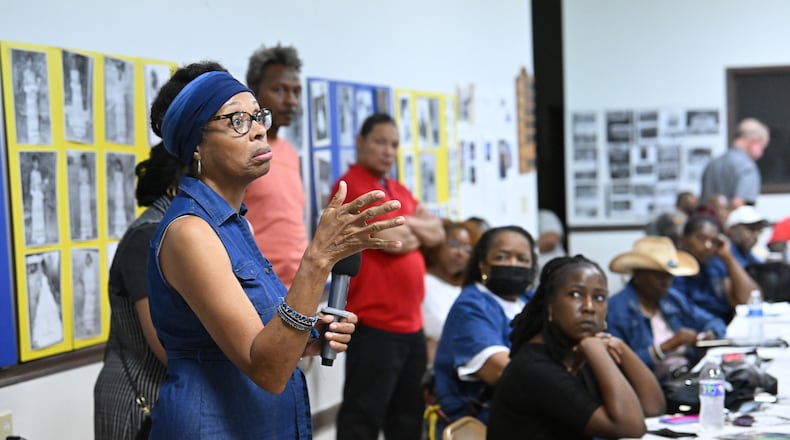DOUGLAS, Ga. — Swept up in the Georgia indictment of Donald Trump and his allies, Coffee County residents rallied in a small-town church Saturday to demand answers about the breach of their local elections office that contributed to an alleged conspiracy to overturn the 2020 presidential race results.
Many of the 60 people at the town hall wanted to know how their county’s elections supervisor and a teacher-turned-fake elector could allow intruders to copy elections software, voting data and ballots in the South Georgia county of 43,000 people.
Four of the 19 people charged last week in the Fulton County racketeering indictment are directly tied to the events of Jan. 7, 2021 — the day after riots at the U.S. Capitol — when technicians hired by former Trump attorney Sidney Powell copied a trove of election data at the Coffee County elections building.
“We’ve got to hold them accountable, and guess what? We have the power to do it right here in this church,” said Cliff Albright, co-founder of the group Black Voters Matter. “We all have the power to get the answers to these questions, because it’s not just about looking back. It’s about looking forward to next election … to make sure that it happens the right way.”
The town hall at Gaines Chapel AME Church sought to put public pressure on local county government to find out when election officials learned of the breach, why it took so long to uncover the scandal, and why police weren’t notified sooner.
“This is so important. This is a threat to our democracy,” said Olivia Coley-Pearson, a Douglas city commissioner. “If there’s a way to control people’s votes or manipulate people’s votes, all the things we’ve fought for throughout the years for our right to vote is thrown out the window.”
The breach in the Republican county that overwhelmingly supported Trump exposed Georgia’s statewide election software to the former president’s supporters, who then distributed it to conspiracy theorists who were trying to discredit the 2020 election results.
Election security experts have said the disclosure of Georgia’s election software, which is supposed to be kept secure by election officials, could help hackers develop malware to flip votes or give ammunition to conspiracy theorists to spread misinformation.
Credit: HYOSUB SHIN / AJC
Credit: HYOSUB SHIN / AJC
Democrat Joe Biden defeated Trump by about 12,000 votes in Georgia, an outcome verified by three vote counts and repeated investigations that rejected claims of ballot-stuffing, dead voters and fraud.
The Coffee County incident is one of several parts of the indictment’s alleged “criminal enterprise,” which included Trump’s false statements of voting fraud, his phone call pressuring Secretary of State Brad Raffensperger to “find” extra votes, a scheme to count the phony votes of Republican Party presidential electors and harassment of Fulton County election workers.
Jim Hudson, a retired attorney, said he doesn’t want his home county to be known as “crooked Coffee.”
“Many people that I speak to about the situation have no idea what occurred,” Hudson said. “A lack of transparency means the public doesn’t know. How can you care about something that you don’t know about?”
The four people charged in the Coffee County case are Powell, Republican Party fake elector Cathy Latham, bail bondsman Scott Hall and former county elections supervisor Misty Hampton.
The breach was uncovered last year by the Coalition for Good Governance, one of the organizers of the town hall meeting. The group is suing Georgia, seeking to force the state to switch from its current system using electronic voting machines that print out ballots to paper ballots filled out by hand.
“The real risks are for the future, not the past,” said Marilyn Marks, the executive director of the Coalition for Good Governance. “We’re worried that this could affect not just Coffee but the whole state in 2024. At a minimum, they can use it to create lies and false evidence. The public has to take this on their own and demand local accountability.”
Bobby Worthy, a member of the Georgia NAACP, said local and state officials haven’t done much to investigate the Coffee County incident and secure elections.
“If we have no accountability, there will be no effective change, period,” Worthy told the crowd.
The town hall was organized by several election and civil rights groups, including Black Voters Matter, Coalition for Good Governance, Free Speech for People, the NAACP of Georgia, S.A.F.E. to Thrive and Southern Rural Black Women’s Initiative.
About the Author




